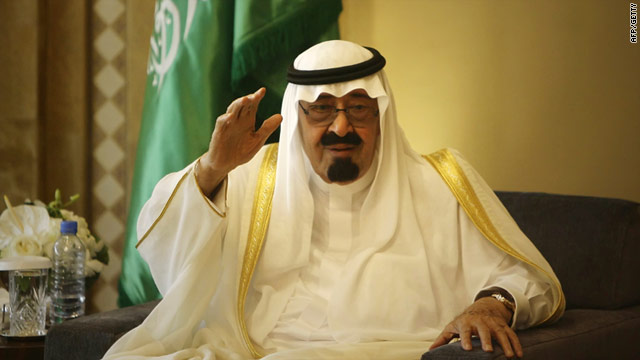Activists disappointed by Saudi king's reforms

- The king announced a sweeping package of reforms Friday
- Activists say they do little to meet their demands
- Some of the reforms promise billions for new homes and hospitals
(CNN) -- Saudi reform activists responded with disappointment Friday after the king promised a major package of reforms meant to quell growing dissatisfaction in his country.
Other than a pledge to set up an anti-corruption agency, the activists said, King Abdullah promised little to meet their demands. Instead, the long list of new measures simply expands powers for the kingdom and the religious establishment.
"I feel disappointed, to say the least," said one Saudi activist who did not give his name for fear of reprisals. "I do believe after these decrees, instead of sweeping reforms, they'll start sweeping up the activists. I'm afraid there will be a crackdown on activists here."
After the king made his rare short speech, his spokesman went on the air for more than half an hour to announce the list of reforms -- one of which involves sanctions for any member of the media who does not respect the views of Muslim scholars and the Quran.
Other measures promise billions of dollars in housing for Saudi citizens, new hospitals and medical centers, and the refurbishment of public spaces.
Saudi human rights activist Mohammed Al-Qahtani, the head of the Saudi Civil and Political Rights Association, said the financial package was the easiest thing to propose.
"It's basically trying to buy out people so they won't go out into the streets," Al-Qahtani said. "It supports these repressive mechanisms."
Saudi Arabia, like other countries in the region, has seen increased demonstrations in recent months. Unlike other parts of the Middle East and North Africa, however, the demands of Saudi protesters are focused more on reforms and liberalization rather than demands for freedom or an end to the government's rule.
King Abdullah promised $1,000 each month for job-seekers in the public and private sectors and vowed to speed up the job-seeking process.
He pledged to spend 250 billion riyals ($66.7 billion) on new housing across the kingdom and 16 billion riyals ($4.3 billion) to build hospitals or add to existing ones.
About 60,000 jobs will be created at the Interior Ministry, the king's spokesman said, and the government will promote all officers throughout the military and security sectors "who deserve it." Military housing will also be upgraded, he said.
About 500 million riyals ($133 million) will go toward refurbishing public spaces, the spokesman said. Organizations that help people learn the Quran will get 200 million riyals ($53 million), and another 100 million ($26.7 million) will be allocated for an Islamic studies institution.
The spokesman said 500 jobs would be created at the Ministry of Commerce and Industry, which must speed up the punishment of anyone involved in price-tampering.
CNN's Mohammed Jamjoom contributed to this report.
